Table of Contents
A Balkan breakfast is more than just a morning meal—it’s a rich culinary tradition that reflects the vibrant culture and flavors of the Balkans. Indeed, from flaky burek to tangy yogurt paired with fresh vegetables, many wonder: how healthy is Balkan breakfast? In essence, this unique and nutritious way to start the day has both benefits and considerations.
Nutritional Components of Balkan Breakfast
How healthy is Balkan breakfast? Generally speaking, Balkan breakfasts are known for their rich flavors and reliance on high-quality, locally-sourced ingredients. Not only do these components define the culinary traditions of the region, but they also contribute significantly to the nutritional value of the meals. To illustrate, let’s explore the core elements that make up a traditional Balkan breakfast and their health benefits.
Overview of Key Ingredients
A Balkan breakfast typically includes staples such as bread, cheese, yogurt, eggs, fresh vegetables, and occasionally cured meats or spreads. Notably, these ingredients are selected for their taste, availability, and cultural significance. Here’s a closer look:
- Bread: Most Balkan households serve freshly baked bread, such as pita or lepinja. While white bread is common, whole-grain options are also gaining popularity.
- Dairy Products: Cheese and yogurt play a starring role, with varieties like feta, kashkaval, and creamy Balkan yogurt offering protein, calcium, and probiotics. Furthermore, these dairy products are a cornerstone of Balkan cuisine.
- Eggs: A common breakfast item, eggs are often prepared as omelets or boiled, providing an excellent source of protein and essential vitamins. Moreover, eggs add versatility to the meal.
- Fresh Vegetables: Tomatoes, cucumbers, and peppers are served raw and sliced, adding a dose of fiber, vitamins, and hydration. In particular, this emphasis on fresh produce highlights the region’s connection to seasonal ingredients.
- Ajvar and Spreads: This roasted red pepper spread is a Balkan favorite, delivering a smoky flavor and a boost of vitamins A and C. Indeed, its vibrant flavor enhances many breakfast dishes.
- Cured Meats (Optional): Items like sujuk (a spiced sausage) are occasionally included, although they should be consumed in moderation due to their high fat and sodium content.
Fun Fact: Did you know that ajvar, a popular Balkan spread, is sometimes called “vegetarian caviar”? Its smoky flavor comes from roasted red peppers and eggplants.
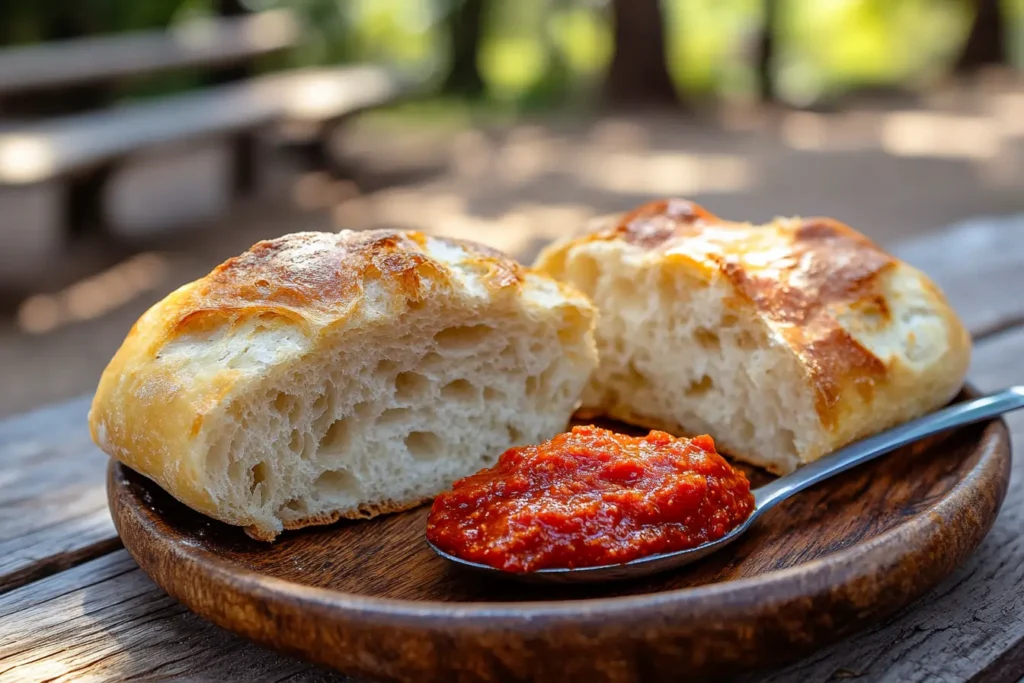
Nutritional Benefits of Balkan Dairy Products
Dairy is central to many Balkan breakfasts, offering both taste and nutrition. Here’s why it stands out:
- Protein Powerhouse: Cheeses like feta and kashkaval are high in protein, aiding in muscle repair and growth.
- Rich in Calcium: Essential for bone health, calcium is abundant in most Balkan dairy products.
- Probiotic Benefits: Yogurt varieties, especially those from the Balkans, are rich in probiotics, which support gut health and improve digestion.
Importance of Fresh Vegetables in Balkan Meals
A defining feature of Balkan breakfasts is the inclusion of fresh, raw vegetables. Significantly, these vibrant additions not only enhance the meal’s visual appeal but also provide significant health benefits:
- Rich in Antioxidants: Tomatoes and peppers contain lycopene and vitamin C, which combat oxidative stress.
- Hydration: Vegetables like cucumbers are water-rich, helping to keep you hydrated.
- Low in Calories, High in Fiber: These vegetables are filling yet low in calories, making them ideal for weight-conscious individuals.
“Freshness is at the heart of Balkan breakfasts, turning simple ingredients into a symphony of health and flavor.”
Balancing Flavor with Nutrition
One of the reasons Balkan breakfasts are so beloved is their balance between indulgence and nutrition. While it may be true that some components, like cheese and cured meats, can be high in sodium and fat, the inclusion of vegetables and fermented foods creates a balanced plate. In this context, moderation is key to enjoying the full health benefits of this regional cuisine.
Popular Balkan Breakfast Dishes
The Balkan region offers a rich variety of breakfast dishes, each carrying a unique cultural and nutritional significance. Typically, these meals are designed to energize the day, combining hearty ingredients with bold flavors. To illustrate, let’s explore some of the most popular and iconic options in a traditional Balkan breakfast.
Ajvar and Bread: A Simple Yet Nutritious Option
Ajvar, a roasted red pepper spread, is a staple in Balkan breakfasts. When paired with freshly baked bread, it creates a simple yet satisfying meal.
- Ingredients: Ajvar, pita or lepinja (traditional bread)
- Health Benefits: Ajvar is low in calories but rich in vitamins A and C, thanks to its pepper and eggplant base. Bread adds carbohydrates for energy, making this a balanced option when consumed in moderation.
Tip for Health Conscious Eaters: Swap out white bread for whole-grain or rye varieties to boost fiber and nutrient intake.
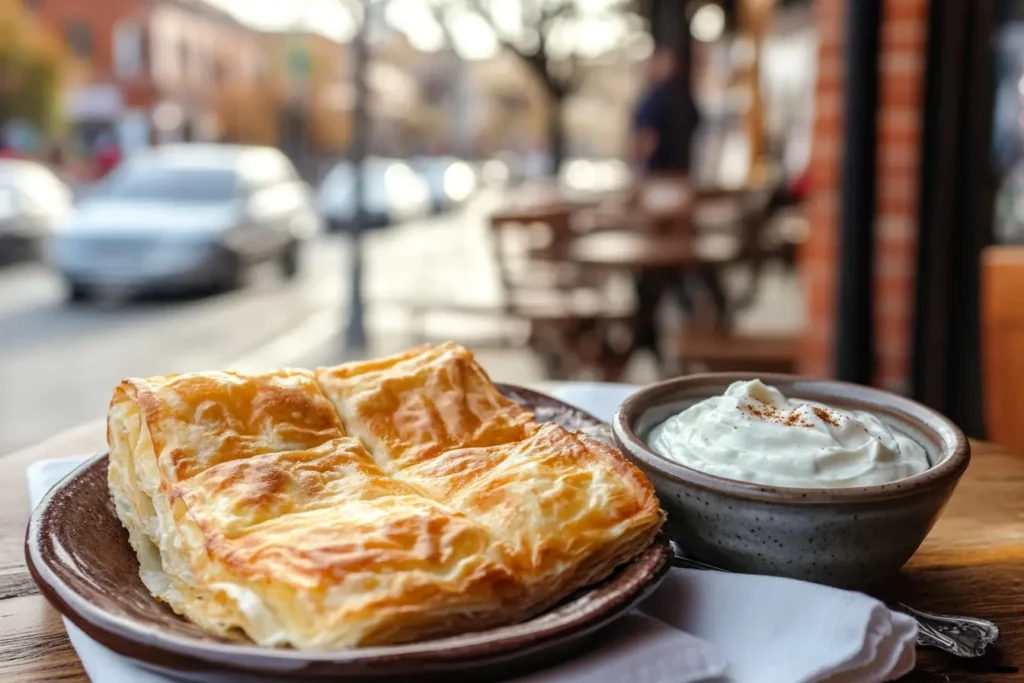
Burek: A Hearty and Caloric Delight
Burek, a flaky pastry filled with cheese, meat, or spinach, is a beloved breakfast item throughout the Balkans. While it’s undeniably delicious, it’s also one of the more indulgent dishes.
- Ingredients: Phyllo dough, cheese (or meat/spinach), oil or butter
- Nutritional Note: High in calories due to the dough and butter, but also a good source of energy. Pairing it with fresh vegetables can help balance its richness.
Did You Know? Burek is believed to have originated in the Ottoman Empire and has since become a Balkan breakfast icon.
Cheese and Yogurt Variants: Probiotics and Protein
A platter of cheese and yogurt is a common sight on Balkan breakfast tables. These dairy products are often served with bread and vegetables, creating a well-rounded meal.
- Popular Choices: Feta cheese, kashkaval, Balkan yogurt
- Health Benefits: High in protein, calcium, and probiotics, this combination supports muscle repair, bone health, and gut health.
“Cheese and yogurt are the soul of Balkan breakfasts—comforting, nutritious, and deeply rooted in tradition.”
Balkan Coffee: A Morning Tradition
No Balkan breakfast is complete without a cup of rich, aromatic Balkan coffee. Similar to Turkish coffee, it’s prepared by boiling finely ground coffee in a special pot called a džezva.
- Ingredients: Ground coffee, water, optional sugar
- Health Perks: Provides a quick energy boost and contains antioxidants that support brain and heart health.
- Caution: Consumed in moderation, it can be part of a healthy routine. Overconsumption, however, may lead to caffeine-related issues like insomnia or increased heart rate.
Other Regional Favorites
- Proja (Cornbread): Made from cornmeal, this dish is gluten-free and packed with fiber and complex carbs.
- Egg Dishes: Simple preparations like scrambled eggs or poached eggs often accompany the main breakfast spread.
- Sujuk (Spiced Sausage): A flavorful yet high-sodium addition best enjoyed in small portions.
The variety in a Balkan breakfast ensures there’s something for everyone, from light and fresh options to rich and hearty meals. Each dish is a testament to the region’s love for bold flavors and wholesome ingredients.
Comparing Balkan Breakfast with Other Regional Breakfasts
The Balkan breakfast stands out for its unique combination of simplicity and diversity. When compared to other regional breakfast traditions, it reveals fascinating similarities and contrasts that highlight its cultural and nutritional value.
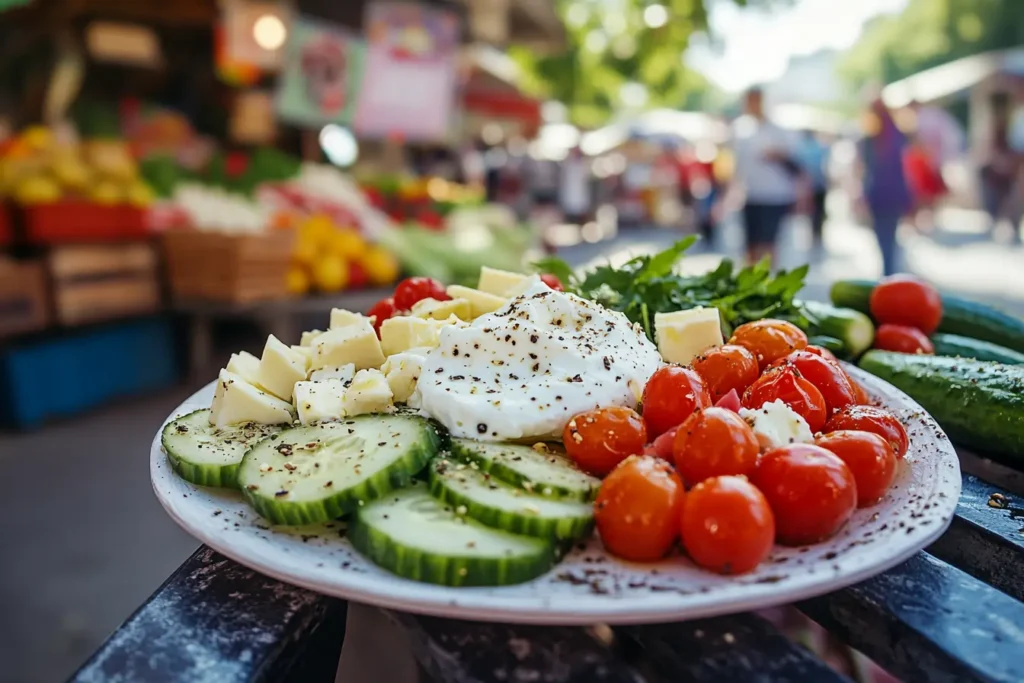
How It Differs from Western Breakfasts
Western breakfasts, especially those popular in the United States and parts of Europe, tend to focus on sweet or processed items such as cereals, pancakes, and pastries. The Balkan breakfast, on the other hand, emphasizes savory dishes and fresh, locally sourced ingredients.
| Aspect | Balkan Breakfast | Western Breakfast |
|---|---|---|
| Main Components | Cheese, yogurt, vegetables, bread | Sugary cereals, pancakes, sausages |
| Key Nutrition | Protein, probiotics, fiber | High in sugar, refined carbs, and fat |
| Preparation | Simple, with minimal processed foods | Often involves pre-packaged items |
Key Takeaway: While Western breakfasts can be quick and convenient, they often lack the balance of whole foods found in a typical Balkan morning meal.
Mediterranean Diet Similarities
The Balkan breakfast shares many elements with the Mediterranean diet, which is widely praised for its health benefits. Both cuisines prioritize fresh vegetables, healthy fats, and fermented dairy products.
- Common Ingredients: Olive oil, tomatoes, feta cheese, and yogurt are staples in both diets.
- Health Benefits: Rich in antioxidants, heart-healthy fats, and anti-inflammatory nutrients, these diets are associated with lower risks of chronic diseases.
Fun Fact: The Mediterranean diet is recognized by UNESCO as an Intangible Cultural Heritage of Humanity, emphasizing its cultural and health significance.
Unique Features of Balkan Cuisine
What sets the Balkan breakfast apart from both Western and Mediterranean breakfasts is its emphasis on traditional preparation methods and communal dining. For instance:
- Ajvar Preparation: Ajvar is often homemade, involving hours of roasting and blending red peppers. This labor-intensive process creates a rich, smoky flavor that’s difficult to replicate.
- Coffee Rituals: Similar to Turkish coffee, Balkan coffee preparation is a cherished ritual, often enjoyed slowly with friends and family.
- Bread Culture: Freshly baked bread, like lepinja, is a must-have and symbolizes hospitality and tradition.
Lessons from the Comparison
- Nutrition Over Convenience: The reliance on fresh, unprocessed foods in the Balkans is a stark contrast to many convenience-focused breakfast traditions.
- Cultural Value: Breakfast in the Balkans is often a social occasion, encouraging mindfulness and connection—something that can be missing in other regions’ fast-paced meals.
“The Balkan breakfast is more than just food—it’s a celebration of tradition, flavor, and community.”
Exploring these comparisons helps to better understand why the Balkan breakfast remains a cherished and nutritionally valuable tradition.
A Healthy Twist on Balkan Breakfast
While a traditional Balkan breakfast is rich in flavor and nutrition, modern dietary preferences and health considerations often call for modifications. By making small changes to classic recipes, you can enjoy the essence of this beloved cuisine with a healthier spin.
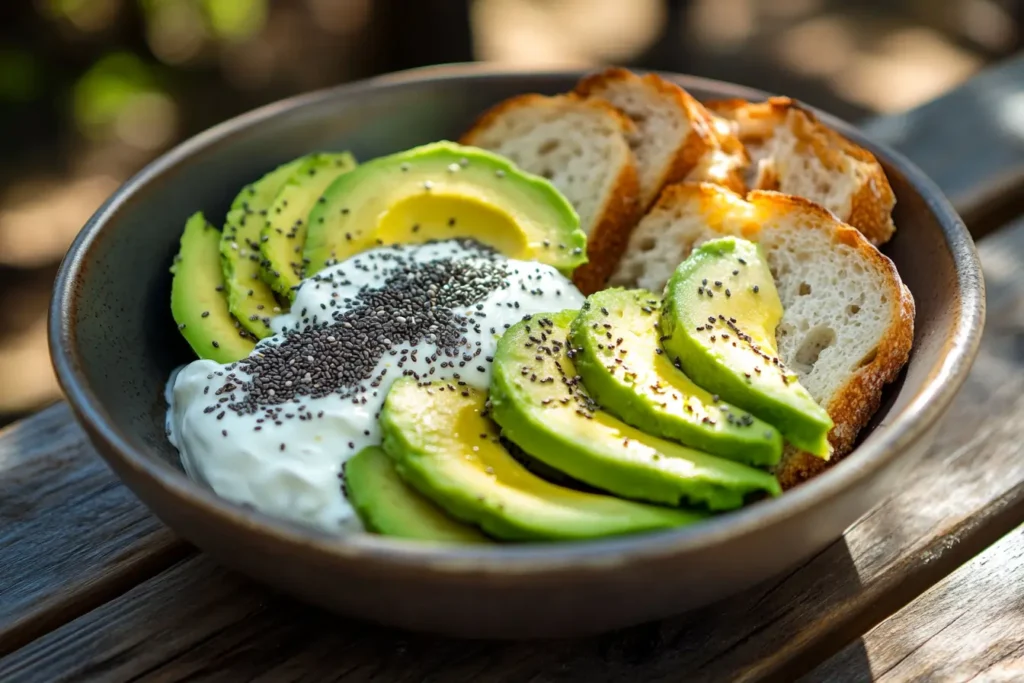
Modifications for a Low-Calorie Balkan Breakfast
Reducing calorie density in Balkan breakfasts is simple with a few strategic swaps.
- Switch to Whole-Grain or Gluten-Free Bread:
- Replace white bread or lepinja with whole-grain, rye, or gluten-free options for added fiber and nutrients.
- Lighten the Dairy:
- Opt for low-fat or fat-free versions of yogurt and cheese to reduce saturated fat.
- Cut Down on Oil and Butter:
- Use olive oil sparingly in place of butter for a healthier fat source.
Example: Instead of a full-sized burek, try a smaller portion served with a side of fresh vegetables to balance the richness.
Vegan and Vegetarian Options
Plant-based eaters can still enjoy a Balkan-style breakfast with a few substitutions:
- Vegan Cheese Alternatives: Use cashew-based feta or almond cheese for the same tangy flavor.
- Egg Substitutes: Tofu scrambles or chickpea flour omelets mimic the texture and protein content of eggs.
- Ajvar as a Star: Ajvar, a naturally vegan spread, pairs perfectly with whole-grain bread and a side of raw veggies for a fresh and balanced meal.
“Roasted eggplant and hummus make excellent replacements for traditional dairy spreads in a vegan Balkan breakfast.”
Gluten-Free Substitutes
For individuals with gluten intolerance, the bread and pastry elements of a Balkan breakfast can be replaced with gluten-free alternatives:
- Gluten-Free Burek: Use gluten-free phyllo dough or create a crustless version using egg and cheese.
- Polenta (Proja): Corn-based dishes like proja are naturally gluten-free and offer a satisfying base for toppings like ajvar or yogurt.
Note: Many traditional Balkan recipes, like vegetable platters, yogurt, and cheese plates, are inherently gluten-free.
Recipe for a Balanced Balkan Breakfast
Ingredients:
| Ingredient | Quantity |
|---|---|
| Whole-grain bread | 2 slices |
| Ajvar | 2 tablespoons |
| Hard-boiled egg | 1 |
| Low-fat feta cheese | 50 grams |
| Raw vegetables (tomatoes, cucumbers, and peppers) | 1 cup |
| Balkan-style yogurt (low-fat) | 1 cup |
Preparation:
- Spread the ajvar over the bread slices.
- Slice the egg and arrange it alongside the bread.
- Add the vegetables, feta cheese, and yogurt to complete the meal.
Calories: Approximately 350-400 calories, depending on portion sizes.
Creative Time-Saving Tips
- Batch-Prepare Ajvar: Store homemade ajvar in jars for quick use throughout the week.
- Pre-Chop Vegetables: Keep ready-to-eat sliced vegetables in the fridge for easy assembly.
- Use Pre-Made Alternatives: High-quality store-bought options, like low-sodium cheese or yogurt, can save time without sacrificing health.
“Healthy eating doesn’t mean giving up on tradition—it’s about finding new ways to celebrate it.”
A healthy twist on the Balkan breakfast offers the best of both worlds: the vibrant flavors of the region and a nutritional profile that aligns with modern health goals. By making these simple modifications, you can savor this delightful cuisine without compromising your well-being.
FAQs
What makes Balkan breakfast unique?
The combination of fresh vegetables, dairy products, and traditional bread sets the Balkan breakfast apart. It emphasizes local, wholesome ingredients and is often enjoyed in a communal setting.
Can Balkan breakfast fit into a weight-loss plan?
Yes, by choosing lower-calorie options like whole-grain bread, low-fat cheese, and yogurt while limiting portions of high-fat items like burek, a Balkan breakfast can support weight-loss goals.
Are all Balkan breakfasts high in calories?
Not necessarily. While items like burek can be calorie-dense, other options—such as ajvar with vegetables and yogurt—are lighter and nutrient-rich.
What are some quick Balkan breakfast recipes?
A simple dish of whole-grain bread with ajvar, low-fat cheese, and raw vegetables is quick, nutritious, and full of flavor. Pre-made ajvar and yogurt can save additional time.
Is Balkan coffee healthy?
In moderation, Balkan coffee can be a healthy part of breakfast. It is rich in antioxidants and provides an energy boost, but excessive consumption may lead to issues like insomnia or increased heart rate.
How can I make Balkan breakfast gluten-free?
Many Balkan breakfast components, such as yogurt, cheese, and vegetables, are naturally gluten-free. For bread and pastries, substitute with gluten-free varieties or use corn-based dishes like proja.
Conclusion
The Balkan breakfast is a celebration of wholesome ingredients, cultural tradition, and bold flavors. In particular, its combination of fresh vegetables, protein-rich dairy products, and simple yet satisfying staples like bread and spreads offers a balanced and nutritious start to the day. However, some components, such as burek and cured meats, may be higher in calories or sodium. Even so, they can still be enjoyed in moderation as part of a healthy diet.
For instance, for those seeking a modern twist, incorporating whole-grain breads, low-fat dairy, or plant-based alternatives ensures that the essence of a Balkan breakfast can fit a variety of dietary needs. Additionally, the emphasis on fresh, unprocessed foods and communal dining adds not only nutritional value but also an emotional connection to mealtime.
Ultimately, how healthy a Balkan breakfast is depends on how it is prepared and consumed. Whether traditional or adapted, it remains a timeless example of how simple, high-quality ingredients can come together to create a meal that nourishes both body and soul.

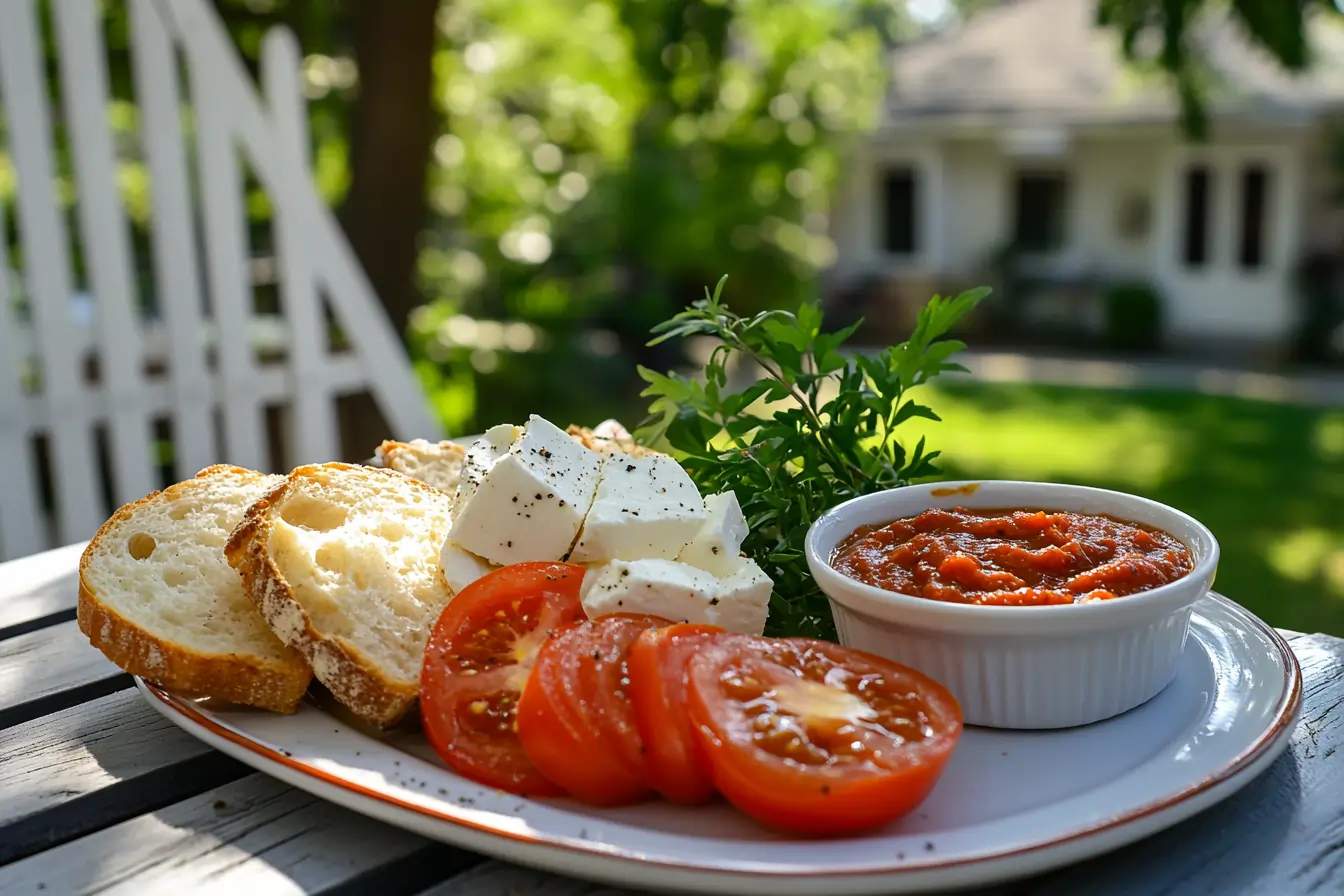

1 thought on “How healthy is Balkan breakfast?”